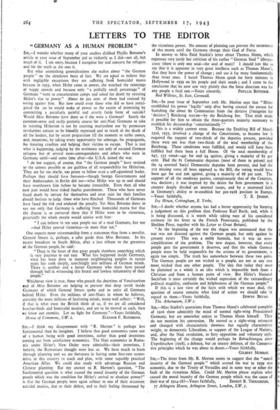• SrR,—I think my disagreement with "R. Merton " is
perhaps less fundamental than he imagines. I believe that good economics come out of a human being with good intentions, rather than good intentions coming out from satisfactory 'economics. The Nazi economics in Ruma- nia under Hitler's New Order were admirable—their intentions, I believe, the Rumanians thought were less so. We have much to learn through planning and we are fortunate in having some first-rate econo- mists in this country to teach and plan, with some superbly practical American Allies. We could also study with advantage Russian and. Chinese planning. But my answer to R. Merton's question, " The fundamental question is what caused the moral insanity of the German people which was the condition for Hitler's arrival to absolute power?" is that the German people were again subject to one of their recurrent suicidal manias, due to their defeat, and to their feeling threatened by
the victorious power. No amount of planning can prevent the recurrence of this mania until the Germans change their God of Force.
In answer to Miss Enid Starkie's letter about Thomas Mann, which expresses very justly her criticism of his earlier " German Soul " idiosyn- crasy (there is only one soul—the soul of man)! I should just like to say that it is apparent in very great intellects such as Thomas Mann's, that• they have the power of change ; and use it far more fundamentally
• than lesser ones. I heard Thomas Mann speak for forty minutes in Hollywood in 1939 on his people and their needs t and I came to the conclusion that he now saw very plainly that the force direction was for


























 Previous page
Previous page